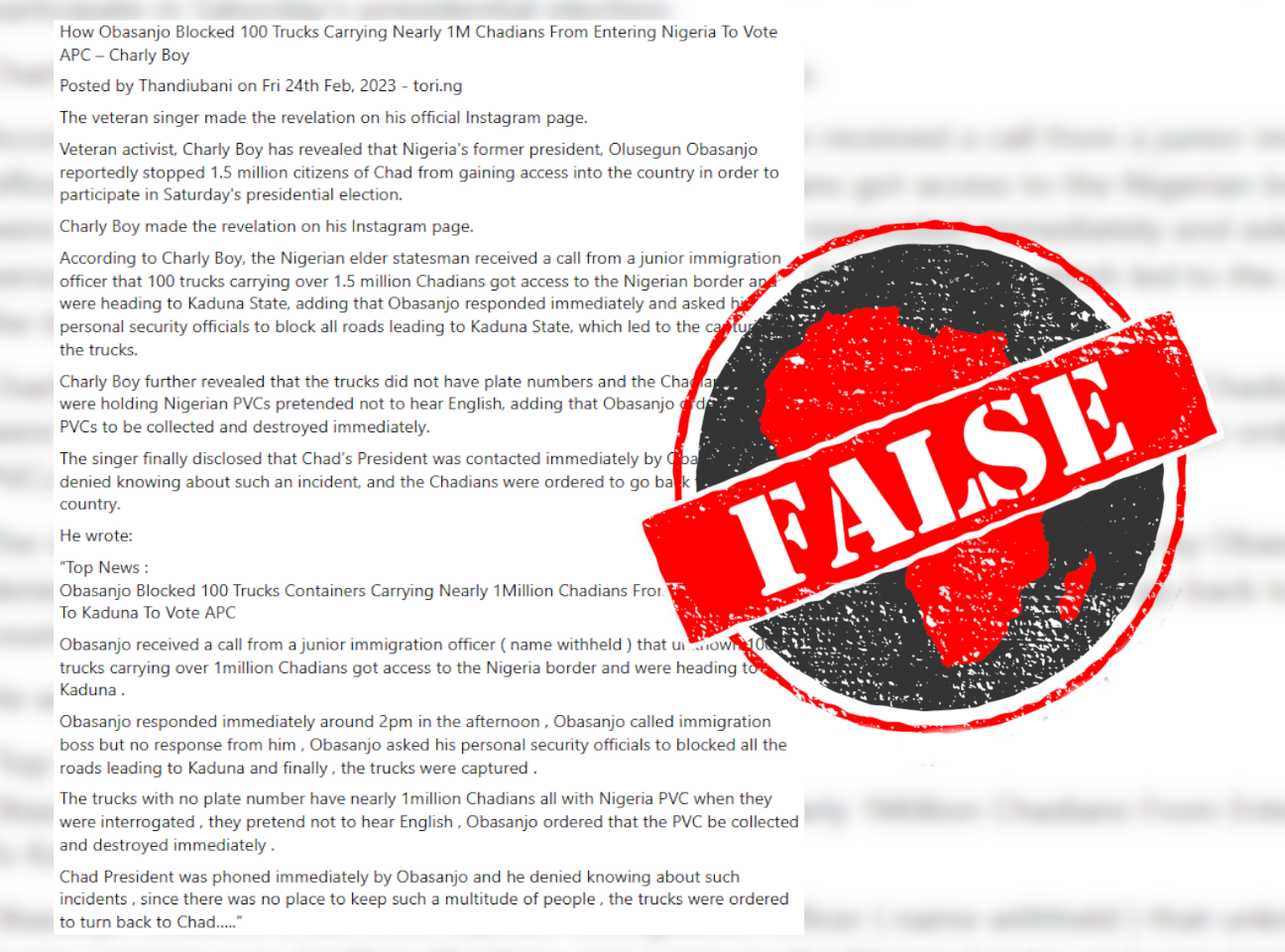IN SHORT: As Nigerians vote in presidential elections, a widely shared claim is that hundreds of thousands of Chadians were set to vote for the APC, before a former president helped turn them away. This is false.
A message circulating on Facebook claims that former Nigerian president Olusegun Obasanjo intercepted and helped turn back dozens of trucks carrying a million Chadians with permanent voter cards.
It says the Chadians intended to vote for the governing All Progressives Congress (APC) party. Nigerians were on Saturday 25 February 2023 voting for a new president and federal lawmakers.
The APC has been in office since 2015, and is hoping to retain power with president Muhammadu Buhari set to step down after the elections.
Part of the message reads:
Obasanjo received a call from a junior immigration officer ( name withheld ) that unknown 100 trucks carrying over 1million Chadians got access to the Nigeria border and were heading to Kaduna.
Obasanjo responded immediately around 2pm in the afternoon , Obasanjo called immigration boss but no response from him , Obasanjo asked his personal security officials to blocked all the roads leading to Kaduna and finally , the trucks were captured.
The claim is attributed to “veteran activist, Charly Boy”. It appears on the Instagram handle of Charles Oputa, a Nigerian entertainer with 194,000 followers. Oputa goes by the stage name of Charly Boy.
Actor Tessy Oragwa also posted it on her verified Facebook page, which has 1.5 million followers.
But did any of this happen?

Ten thousand people in a single truck?
Some of the claims in the message defy belief. It swings from “over 1.5 million Chadian citizens” and just “1.5 million” to “over 1 million” Chadian citizens and “nearly” 1 million Chadians.
The number of trucks is constant – 100. Taken at face value, this would mean that 10,000 to 15,000 Chadians were crammed into a single truck. This is implausible.
The number of foreigners involved, the alleged involvement of a high-profile figure like Obasanjo, and what it would mean for the credibility of the election if true, means that such a story would have been widely reported in the media. We found no such coverage.
A Google reverse image search of one of the photos accompanying the message reveals that it is from a 2021 incident between the police and Fulani herders in Kwara state in Nigeria’s north-central region.
Another photo used as evidence for the claim is from a 2021 arrest of armed men by Amotekun, a local security group in Oyo state, southwestern Nigeria.
Kehinde Akinyemi, Obasanjo’s spokesperson, told Africa Check that his principal was not involved in such an incident.
The use of such out-of-context photos is an expected disinformation tactic on election day. For more on what type of disinformation to expect, read our blog.
Republish our content for free
For publishers: what to do if your post is rated false
A fact-checker has rated your Facebook or Instagram post as “false”, “altered”, “partly false” or “missing context”. This could have serious consequences. What do you do?
Click on our guide for the steps you should follow.
Publishers guideAfrica Check teams up with Facebook
Africa Check is a partner in Meta's third-party fact-checking programme to help stop the spread of false information on social media.
The content we rate as “false” will be downgraded on Facebook and Instagram. This means fewer people will see it.
You can also help identify false information on Facebook. This guide explains how.



Add new comment